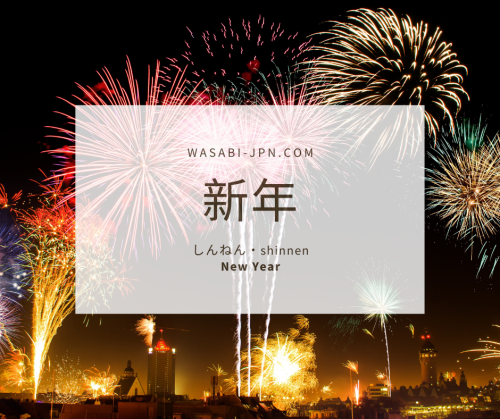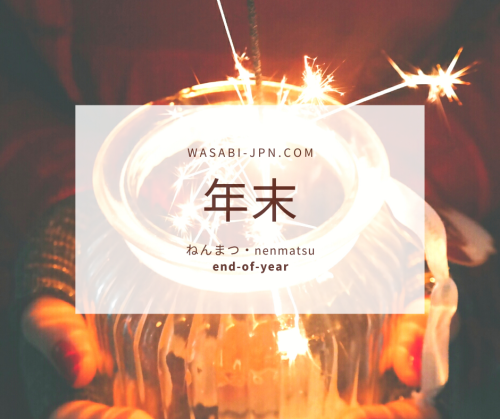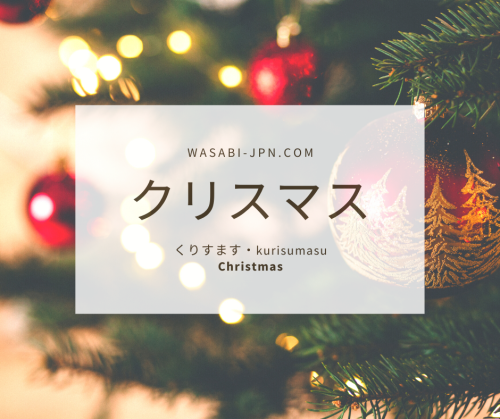#japanese lessons
Today’s featured word is 年末(nenmatsu)which means “end of the year” but is often used to describe the few days that most companies and shops are closed in Japan from the end of December until the beginning of January. 皆さんの年末の予定はなんですか?What are your plans for the end of the year?
Post link
We’re giving away 3 month memberships to iKnow! Reblog this and follow us for your chance to win!
Post link
Nouns
警察 (けいさつ) Police; Police Station
ちかん Sexual Offender; Pervert
どろぼう Thief
犯人 (はんにん) Criminal
弁護士 (べんごし) Lawyer
手錠 (てじょう) Hand Cuffs
人殺し (ひとごろし) Murder; Murderer
じゅう gun
犯罪 (はんざい) Crime盗難 (とうなん) Theft; Robbery
やくざ Japanese Mafia
牢獄 (ろうごく) prison; jail
囚人 (しゅうじん) prisoner; convict
Verbs
盗む (ぬすむ) to steal
殺す (ころす) to kill
死ぬ (しぬ) to die
うつ to shoot (at)
捕まえる (つかまえる) to catch; to arrest
The ~て form of a verb and しまう together translate to having ended up doing that verb. Please note that this is usually in a negative sense.
Let’s have an example,
二切符を買ってしまいました。 I ended up buying two tickets.
There is an informal, short form of しまう as well. This form is slightly harder to pronounce and form however.
Depending on whether the ~て form being used makes a ~て, ~って, or ~んで after being conjugated, the form can change a little…
The final ~て is replaced by ~ちゃう
The final ~って is replaced by ~っちゃう
The final ~んで is replaced by ~んじゃう
The past tense of course would be ちゃった, っちゃった, or じゃった
Modifying the example above into,
二切符を買っちゃう or 二切符を買っちゃった
Hope this was informative! This form is used a lot and is common in informal situations and casual speech. If you have any requests feel free to ask away :3
The simplest form of verb conjugation is ~ますform, which is a polite yet general form. It can basically be used for any situation, but is not considered a casual speak. For foreigners, this is probably the best to know…
There are two types of verbs:
~る verbs (which end in a る)
- 食べる (to eat)
- ねる (to sleep)
~う verbs (who’s last vowel is an う)
- 行く (to go)
- 歌う (to sing)
There are also irregulars… which you just have to memorize
- くる (to come)
- する (to do)
Positive Present and Future Tense
For ~る verbs, you must simply remove the る and add ます
食べる → 食べ → 食べます
ねる → ね → ねます
For ~う verbs, you must replace the final う with an い and then add ます
行く → 行き → 行きます
- note how the く changes to き (replacing the final う with an い)
歌う → 歌い → 歌います
you will need to memorize these two…
する → し → します
くる → き → きます
Positive Past Tense
The same thing must be done as in the Present tense, but instead of adding ます, you must add ました
食べる → 食べ → 食べました
行く → 行き → 行きました
する → し → しました
くる → き → きました
Negative Past and Present Tense
Again… all the same steps are applied, but for present you add ません and for past, ませんでした
食べる → 食べ → 食べません/ 食べませんでした
行く → 行き → 行きません/ 行きませんでした
する → し → しません / しませんでした
くる → き → きません / きませんでした
私の英語の先生は「アメリカで、 たくさんホットドッグを食べました」言っていた
My English teacher said “In America, I ate a lot of Hotdogs”
Any Questions? Feel free to ask anything!
The present tense, short form of a verb can be followed by つもりだ indicating that is is intended to be done.
As a refresher, the present tense short form of a verb is ~て form.
You can see my lesson on ~て here
Let’s try some examples!
六時に晩ご飯を食べてつもりだ。 I intend to eat dinner at six
毎日に一時間が漢字を勉強してつもりだ。Every day I intend to study kanji for one hour.
To make a sentence I don’t intend to do, you use the negative, short tense followed by つもりだ
Let’s try a few more…
六時に晩ご飯を食べないつもりだ。I don’t intend to eat dinner at Six.
大人の時、タバコを吸わなくてつもりだ。I don’t intend to smoke when I’m an adult.
Have any questions or requests? Just ask :)
~たい or ~い form is what is commonly used when saying or asking what you or someone wants. It is pretty simple to set up, so let’s get some examples! (I’m not sure If I taught this already…)
Please note that in polite speech, です should be used after the conjugation!
for ~る verbs, simply remove the る and add たい or たくない (negative).
食(た)べたい I want to eat
食(た)べたくない I do not want to eat
見(み)たい I want to watch
見(み)たくない I do not want to watch
for ~う verbs,simply change to last う sound to an い and add たい or たくない… In the cast of 行く, く has an う sound and that sound must become an い… making it 行き
行(い)きたい I want to go
行(い)きたくない I do not want to go
In formals: just memorize them and they will start to sound natural!
したい I want to do
したくない I don’t want to do
きたい I want to come
きたくない I don’t want to come
Past tense is the same except, ~たかった or ~たくなかった, ~う verbs still change to い like the present!
食べたかった I wanted to eat
食べたくなかった I did not want to eat
行きたかった I wanted to go
行きたくなかった I did not want to go
Remember to add か to the end of the sentence if you are asking a question!
Examples
明日はテストがあるから、単語を勉強したいです。 Because I have a test tomorrow, I want to study vocabulary.
彼の誕生日に、男の子はプレゼントを開けたくなかったです。 On his Birthday, the boy did not want to open any presents
ケーキかアイスクリームを食べたいですか。 Would you like cake or ice cream?
Sorry for short hiatus!
Have any requests for the next guide?
Today there was some sort of rodent in my pond swimming around… i think it was a mink. Either way, it inspired me to talk about animals and some of their counters!
動物 (どうぶつ) means Animal, and since Japanese does not use plurals (usually), it also means Animals. Here are a few examples of creatures, ;D
くま Bear
かえる Frog
やぎ Goat
猫 (ねこ) Cat
犬 (いぬ) Dog
うさぎ Rabbit
虎 (とら・トラ)Tiger
馬 (うま) Horse
猿 (さる) Monky
麒麟 (きりん) Giraffe
豚 (ぶた) Pig
魚 (さかな) Fish
When counting small animals (dogs, cats, fish), you would use the counter
匹 (ひき), respectively:
- 一匹 (いっぴき)
- 二匹 (にひき)
- 三匹 (さんびき)
- 四匹 (よんひき)
- 五匹 (ごひき)
- 六匹 (ろっぴき)
- 七匹 (しち/ななひき)
- 八匹 (はっぴき)
- 九匹 (きゅうひき)
- 十匹 (じゅっぴき)
For counting birds you use 羽 (わ) to use this you simple attach it to the number… it is not irregular. (Any of you guys live near a WaWa (Pennsylvanian Convenience Store)? Maybe that will help you remember!?)
If counting larger animals such as cows or bears, you use 頭 (とう), because for most numbers you just add it after the number, I will only show irregulars!
- 一頭 (いっとう)
8. 八頭 (はっとう)
10. 十頭 (じゅっとう)
何 (なに) generically means ‘what’ in Japanese. The way you manipulate 何 can change its meaning, (this is usually by adding particles). Let’s start with the basic use of 何.
あなたの名前は何ですか。 (あなた の なまえ は なんです か。)
何があなたの名前? (なに が あなた の なまえ?)
Both of these sentences mean 'What is your name?’, the first literally is, “Your name is what?” and the second one is “What is your name?”. Both are acceptable..
When saying the first one, you must note that 何 is slurred into なん and must be written like that (when not using kanji). You can find that 何 –when connected– to a verb or subject will most likely slur to make the sound easier on the ears and mouth.
For example:
When asking 'what time is it?’, 'what’ and 'time’ are together and will be slurred (seeing that 'time’ is the subject that needs questioning, and that it is directly adjacent to 'what’.) 何時ですか。 (なんじ ですか。) 何 and 時 are both grouped together.
In colloquial expressions, sometimes 何 is paired with a particle and usually slurred. The particle used can change the meaning of the phrase.
何で why?; for what reason?
何て how…!; what…!
何でも anything; whatever
何でもいい anything is okay
なんだって What?; What did you say?
This is the end of part 1, part 2 will be up later this week.





